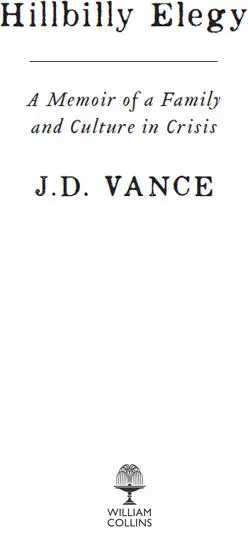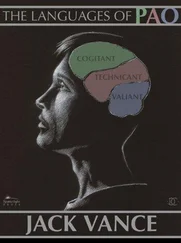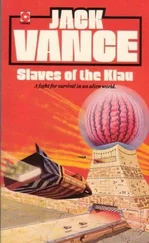
Copyright Copyright Dedication Introduction Chapter 1 Chapter 2 Chapter 3 Chapter 4 Chapter 5 Chapter 6 Chapter 7 Chapter 8 Chapter 9 Chapter 10 Chapter 11 Chapter 12 Chapter 13 Chapter 14 Chapter 15 Conclusion Notes Acknowledgments Credits About the Author About the Publisher
William Collins
An imprint of HarperCollins Publishers 1 London Bridge Street London SE1 9GF
WilliamCollinsBooks.com
First published in Great Britain by William Collins in 2016
First published in the United States by Harper, an imprint of HarperCollins Publishers , in 2016
Copyright © 2016 by J.D. Vance.
NETFLIX is a registered trademark of Netflix, Inc., and its existing affiliates. Artwork used with permission from Netflix, Inc.
J.D. Vance asserts the moral right to be identified as the author of this work.
A catalogue record for this book is available from the British Library.
All rights reserved under International and Pan-American Copyright Conventions. By payment of the required fees, you have been granted the non-exclusive, non-transferable right to access and read the text of this eBook on-screen. No part of this text may be reproduced, transmitted, downloaded, decompiled, reverse engineered, or stored in or introduced into any information storage and retrieval system, in any form or by any means, whether electronic or mechanical, now known or hereinafter invented, without the express written permission of HarperCollins Publishers.
Ebook Edition © November 2020 ISBN 9780008219758
Version: 2020-10-27
Dedication Dedication Introduction Chapter 1 Chapter 2 Chapter 3 Chapter 4 Chapter 5 Chapter 6 Chapter 7 Chapter 8 Chapter 9 Chapter 10 Chapter 11 Chapter 12 Chapter 13 Chapter 14 Chapter 15 Conclusion Notes Acknowledgments Credits About the Author About the Publisher
For Mamaw and Papaw, my very own hillbilly terminators
Cover
Title Page
Copyright Copyright Copyright Dedication Introduction Chapter 1 Chapter 2 Chapter 3 Chapter 4 Chapter 5 Chapter 6 Chapter 7 Chapter 8 Chapter 9 Chapter 10 Chapter 11 Chapter 12 Chapter 13 Chapter 14 Chapter 15 Conclusion Notes Acknowledgments Credits About the Author About the Publisher William Collins An imprint of HarperCollins Publishers 1 London Bridge Street London SE1 9GF WilliamCollinsBooks.com First published in Great Britain by William Collins in 2016 First published in the United States by Harper, an imprint of HarperCollins Publishers , in 2016 Copyright © 2016 by J.D. Vance. NETFLIX is a registered trademark of Netflix, Inc., and its existing affiliates. Artwork used with permission from Netflix, Inc. J.D. Vance asserts the moral right to be identified as the author of this work. A catalogue record for this book is available from the British Library. All rights reserved under International and Pan-American Copyright Conventions. By payment of the required fees, you have been granted the non-exclusive, non-transferable right to access and read the text of this eBook on-screen. No part of this text may be reproduced, transmitted, downloaded, decompiled, reverse engineered, or stored in or introduced into any information storage and retrieval system, in any form or by any means, whether electronic or mechanical, now known or hereinafter invented, without the express written permission of HarperCollins Publishers. Ebook Edition © November 2020 ISBN 9780008219758 Version: 2020-10-27
Dedication Dedication Dedication Introduction Chapter 1 Chapter 2 Chapter 3 Chapter 4 Chapter 5 Chapter 6 Chapter 7 Chapter 8 Chapter 9 Chapter 10 Chapter 11 Chapter 12 Chapter 13 Chapter 14 Chapter 15 Conclusion Notes Acknowledgments Credits About the Author About the Publisher For Mamaw and Papaw, my very own hillbilly terminators
Introduction
Chapter 1
Chapter 2
Chapter 3
Chapter 4
Chapter 5
Chapter 6
Chapter 7
Chapter 8
Chapter 9
Chapter 10
Chapter 11
Chapter 12
Chapter 13
Chapter 14
Chapter 15
Conclusion
Notes
Acknowledgments
Credits
About the Author
About the Publisher
My name is J.D. Vance, and I think I should start with a confession: I find the existence of the book you hold in your hands somewhat absurd. It says right there on the cover that it’s a memoir, but I’m thirty-one years old, and I’ll be the first to admit that I’ve accomplished nothing great in my life, certainly nothing that would justify a complete stranger paying money to read about it. The coolest thing I’ve done, at least on paper, is graduate from Yale Law School, something thirteen-year-old J.D. Vance would have considered ludicrous. But about two hundred people do the same thing every year, and trust me, you don’t want to read about most of their lives. I am not a senator, a governor, or a former cabinet secretary. I haven’t started a billion-dollar company or a world-changing nonprofit. I have a nice job, a happy marriage, a comfortable home, and two lively dogs.
So I didn’t write this book because I’ve accomplished something extraordinary. I wrote this book because I’ve achieved something quite ordinary, which doesn’t happen to most kids who grow up like me. You see, I grew up poor, in the Rust Belt, in an Ohio steel town that has been hemorrhaging jobs and hope for as long as I can remember. I have, to put it mildly, a complex relationship with my parents, one of whom has struggled with addiction for nearly my entire life. My grandparents, neither of whom graduated from high school, raised me, and few members of even my extended family attended college. The statistics tell you that kids like me face a grim future—that if they’re lucky, they’ll manage to avoid welfare; and if they’re unlucky, they’ll die of a heroin overdose, as happened to dozens in my small hometown just last year.
I was one of those kids with a grim future. I almost failed out of high school. I nearly gave in to the deep anger and resentment harbored by everyone around me. Today people look at me, at my job and my Ivy League credentials, and assume that I’m some sort of genius, that only a truly extraordinary person could have made it to where I am today. With all due respect to those people, I think that theory is a load of bullshit. Whatever talents I have, I almost squandered until a handful of loving people rescued me.
That is the real story of my life, and that is why I wrote this book. I want people to know what it feels like to nearly give up on yourself and why you might do it. I want people to understand what happens in the lives of the poor and the psychological impact that spiritual and material poverty has on their children. I want people to understand the American Dream as my family and I encountered it. I want people to understand how upward mobility really feels. And I want people to understand something I learned only recently: that for those of us lucky enough to live the American Dream, the demons of the life we left behind continue to chase us.
There is an ethnic component lurking in the background of my story. In our race-conscious society, our vocabulary often extends no further than the color of someone’s skin—“black people,” “Asians,” “white privilege.” Sometimes these broad categories are useful, but to understand my story, you have to delve into the details. I may be white, but I do not identify with the WASPs of the Northeast. Instead, I identify with the millions of working-class white Americans of Scots-Irish descent who have no college degree. To these folks, poverty is the family tradition—their ancestors were day laborers in the Southern slave economy, sharecroppers after that, coal miners after that, and machinists and millworkers during more recent times. Americans call them hillbillies, rednecks, or white trash. I call them neighbors, friends, and family.
Читать дальше













